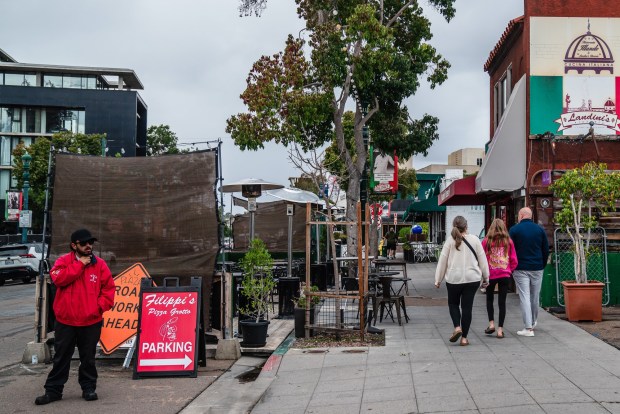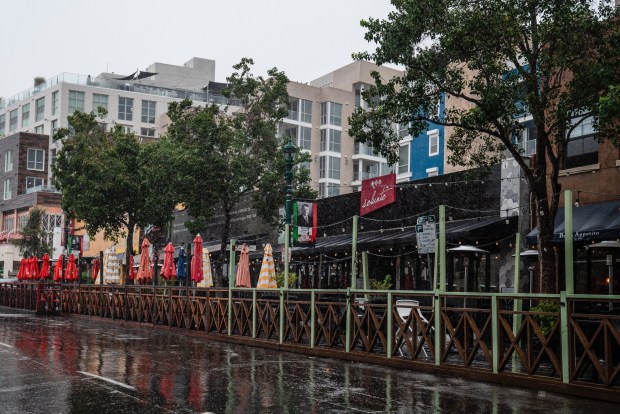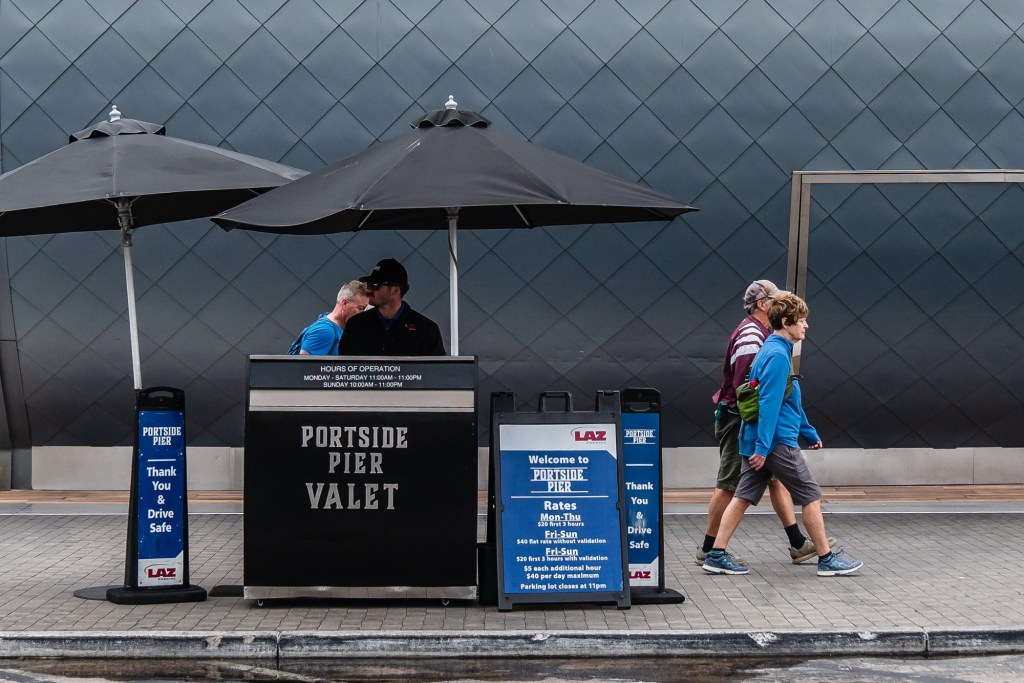San Diego hotel and restaurant owners are balking at a city proposal to charge them steeply higher fees for their valet parking spaces and on-street outdoor dining areas.
City officials say the hikes are justified, because San Diego loses revenue when parking spots that could otherwise have meters are devoted to other uses like dining or valet parking drop-off and pickup.
But critics, including the county lodging association and merchant groups, say the hikes could prompt some restaurants to eliminate on-street dining altogether and force hotel guests to clog streets by double parking.
One Mission Beach restaurant owner said Tuesday the city can’t keep raising fees and costs on a struggling industry and not expect a rash of closures. “We are teetering,” said Eric Christiansen, the owner of Guava Beach Bar & Grill.
The proposal, which the City Council is scheduled to consider early next month, is part of a wider city campaign to cope with expected budget deficits by raising parking rates and beginning to charge in new places like Balboa Park.
City officials say it’s costing taxpayers many thousands of dollars per year in potential parking meter revenue — revenue that could fund city services — by allowing on-street dining and valet spots, especially popular downtown because hotels there lack space for self-parking by their guests.
And the amount of potential revenue the city is missing out on rose sharply this year, after hourly meter rates were doubled from $1.25 to $2.50, daily meter operations were extended by two hours and a special event zone with higher rates was created near Petco Park.
In an effort to recover a greater share of that lost revenue, city officials are proposing to raise the fees for street-dining space by more than 30% and to hike valet parking fees even more dramatically. Currently, those fees are nearly $38 per square foot in most areas; they would rise to $50.
Fees for outdoor dining would rise by nearly 32% in most neighborhoods and even more in the special-event zone. Also, a fee exemption would be eliminated for seating that is open to the public, instead of reserved only for restaurant customers.
 A parking attendant stands near Filippi’s Pizza Grotto in Little Italy on Oct. 14, 2025. (Ariana Drehsler / For The San Diego Union-Tribune)
A parking attendant stands near Filippi’s Pizza Grotto in Little Italy on Oct. 14, 2025. (Ariana Drehsler / For The San Diego Union-Tribune)
For valet spaces, hotels would pay $5,600 per year for the standard allotment of two valet street spots of 22 feet each, up from the current $600 per year. City officials say the $600 is an application fee, and the $5,000 is a new fee that aims to recover part of the city’s costs.
The hotel industry has mostly accepted that change, but it’s objecting to proposed fees for hotels that want more than two valet spots. Each additional valet spot beyond two would cost a hotel $10,000 in areas that have parking meters and $15,000 in the special-event zone.
“That is just too high for guests, as well as the operators, to be able to absorb,” said Fred Tayco, executive director of the San Diego County Lodging Association.
Tayco said some hotels could end up paying close to $100,000 per year if they need several additional valet spots, predicting that scaling back valet spots would lead to dangerous double parking and unloading of luggage.
“While valet parking may appear like a luxury, for downtown it’s a necessity,” said Tayco, noting that 63% of tourists who visited San Diego last year came by car.
Michael Trimble, executive director of the Gaslamp Quarter Association, questioned how the city arrived at the new proposed fee amounts.
“We can’t support arbitrary, unpublished surcharges that punish businesses,” Trimble said.
City officials say the proposed fees were carefully calculated based on the typical revenue a parking meter generates in a year.
Ahmad Erikat, a program manager in the city’s Transportation Department, said a typical meter downtown generates $25 per day, which may rise to $30 per day now that operating hours have been extended by two hours.
Erikat said the city multiplied that rate times the 350 days per year that meters operate — there are 15 holidays per year when they don’t — to get a total expected revenue per downtown meter of $10,500. So the city decided to charge $10,000 for additional valet spots.
“The objective is to be as close as possible to cost recovery,” he said.
In the special-event zone, a similar calculation led the city to propose $15,000 per valet spot, Erikat said.
For restaurants or hotels willing to operate valet spots only from 5 p.m. to midnight, the fee would be $2,500, which is based on how much meter revenue could otherwise be generated during those hours, Erikat said.
He stressed that the first two valet spots would still be heavily subsidized by the city. Instead of charging the $20,000 that cost recovery would dictate — $30,000 in the special-event zone — the city would charge $5,600 for those two spots.
Full cost recovery would kick in only when additional spots beyond the standard two are required by a business.
The proposal was approved 4-0 by the City Council’s Active Transportation and Infrastructure Committee last month. It is scheduled for a vote by the full council on either Nov. 2 or Nov. 3, according to a spokesperson for Mayor Todd Gloria.
 Outdoor dining in Little Italy on Oct. 14, 2025. (Ariana Drehsler / For The San Diego Union-Tribune)
Outdoor dining in Little Italy on Oct. 14, 2025. (Ariana Drehsler / For The San Diego Union-Tribune)
Councilmember Stephen Whitburn, who chairs the committee and represents downtown, said he sympathizes with businesses facing higher fees.
But he suggested keeping those fees down is less important than making sure hotels have the ability to claim additional valet spots if they need them.
“The policy enables valet services to remain possible while enabling the city to recover the true cost of lost parking revenue,” Whitburn said.
He said the hotels make enough money to cover the higher costs. “The collection of valet parking revenue results in some pretty significant revenue,” he added.
Christiansen, the Mission Beach restaurant owner, considers the fee hike for street dining a huge mistake.
“It’s a ridiculous increase by a tone-deaf city,” said Christiansen, who has operated Guava Beach Bar & Grill for 23 years.
With the city’s minimum wage still rising incrementally and costs for food and energy going up, he said the city shouldn’t charge more for street dining spots when restaurants are barely surviving.
“We can’t absorb anymore costs — we are teetering,” he added. “It’s going to be a rude awakening for the city when restaurants start to close. Boarded-up buildings are a bad look for tourists.”
The Little Italy Association, whose businesses would be some of those most affected, declined requests for an interview.

